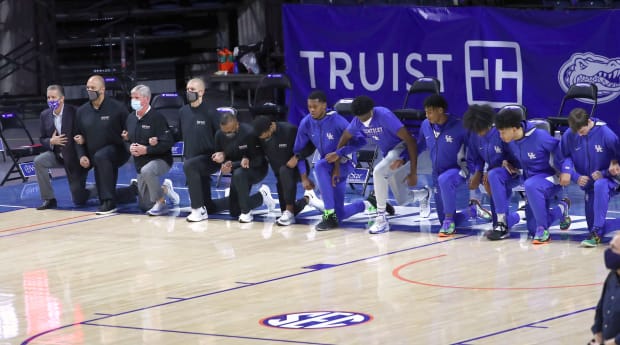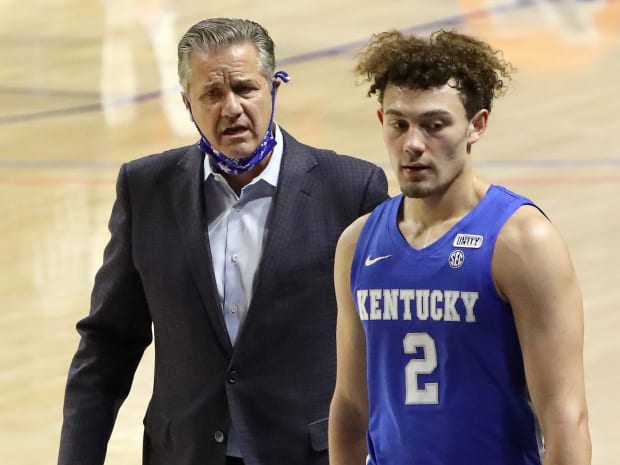John Calipari chose to kneel alongside his players, sparking a controversy among UK's fanbase, despite his team's historically inauspicious start.
LOUISVILLE, Ky. — When he took the knee, John Calipari had to know what was coming.
He’s lived in Kentucky, one of America’s reddest states, since 2009. In the November presidential election, Donald Trump captured 62 percent of the vote in the state and won 118 out of 120 counties—the only exceptions were the two biggest, Jefferson and Fayette, home to the University of Louisville and University of Kentucky, respectively. Jefferson might be the only county in the state that isn’t a majority UK fan base, and even here the Big Blue following is sizable.
In other words, it stands to reason that the fans who passionately follow Calipari’s team are overwhelmingly conservative Republicans. And conservative Republicans are overwhelmingly not in favor of athletes kneeling in protest during the national anthem—especially college athletes. And yet there was Cal joining his Kentucky players on one knee before the Wildcats played at Florida Saturday, three days after the deadly insurrection in Washington, D.C.

“It’s just a peaceful way to protest and raise awareness … of things that have happened recently,” Kentucky center Olivier Sarr said this week.
Calipari said the players wanted him to join them, so he did. “I did kneel with them because I support the guys," he said, later equivocating that it was “probably not a real good time” for the team to take a knee.
It was absolutely the time to make the statement. Risks and all. Maybe this was the eternally combative Cal picking a new fight—with his own constituency.
In that moment, a coach whose approval rating already had plunged after a 1-6 season start—worst for Kentucky in more than a century—took even more on his shoulders. In the authoritarian world of college sports, some coaches would have vetoed the idea altogether. Others would have tried to talk their players out of making a statement at a charged moment in time. Still others would have approved it but not participated.
Cal joined them, putting him on a very short list of college coaches who have taken a knee during the national anthem before a game. Major athletic programs are so terrified of anthem controversies that many of them don’t even have their players on the court or field when the “Star Spangled Banner” is played—a classic College Sports Inc. dodge. (Kentucky, in fact, has had its basketball team in the locker this season when the anthem is played at home games, according to The Courier-Journal in Louisville.)
Calipari went there, and his players appreciated it. “I think what was really powerful was coach doing it with us,” Sarr said.
It took some guts. It took Cal putting his constant “players first” mantra into action involving something other than trying to recruit the next wave of talent.
Then came the hysteria. Kentucky blew out the Gators in by far their best performance of the season, and it barely registered through the blowback. There was some support, to be sure, and not all the dissent was over the top. But some of the sentiment was equal and opposite from the customary fanatical love for Kentucky basketball.
John Root is the sheriff in Laurel County, where Trump received more than 77 percent of the November vote. He posted a video on Facebook with jailer Jamie Moseley wherein they threw UK basketball shirts into a burning cylinder. “This is what I think of the program, Coach, until you can get these guys under control and lead by example,” Root said on the video.
Mike Mitchell is the Judge Executive in Knox County, where Trump received 83 percent of the vote. He introduced a resolution calling for the state to essentially defund the university. The introduction to the resolution read: “Call of action to denounce the University of Kentucky men’s basketball team, and the coaching staff for refusing to stand during the national anthem of the United States of America. This action lacks respect for the veterans that have served our country.”
As the commonwealth fumed, Kentucky played its next game Tuesday night. The Wildcats were routed at home by Alabama, 85-65, dropping to 4-7. It was Calipari’s worst loss in Rupp Arena, and the program’s worst since 1988. And now Cal is getting blasted from all sides for all things—not winning, offending patriots, and, well, not winning.

One thing to keep in mind with Calipari: the registered independent can be a political chameleon, depending on what suits his needs. There have been photo ops with Bill Clinton and John Kerry, but also ultra-conservative former Kentucky governor Matt Bevin. He long ago cozied up to Trump donor and Big Blue booster Joe Craft, namesake for the program’s opulent practice facility.
Regardless, he’s always been a tenacious defender of his players, especially Black players. (Sometimes an enabler.) Whether he’s motivated by what he believes is right or as a permanent recruiting stance is open to conjecture. But as the anthem controversy continued to simmer Thursday, Cal’s all-caps tweet was consistent with who he’s been: “I STAND WITH, FOR AND BY MY PLAYERS. ALWAYS HAVE AND ALWAYS WILL!”
Some longtime Kentucky observers believe fan reactions to the controversy and the losing are separate—that many of them still would be furious at Calipari even if his team was 11-0. Others believe the kneel-down poured gasoline on a bonfire lit by losing. As one fan put it on a Kentucky fan message board Thursday: “This is like when you are in a bad relationship with someone and then every little thing they do bothers you. That's the Cal/fans relationship right now.”
Is the end of the relationship near? Maybe, but it would be financially prohibitive for the school to end the arrangement. In another classic College Sports Inc. flourish, Kentucky athletic director Mitch Barnhart gave then-60-year-old Calipari a so-called “lifetime contract” in 2019—a 10-year deal with salary that escalates from $7.6 million to $8.6 million, with options to make even more. Cal had been batting his eyes at UCLA, and Kentucky responded in dramatic fashion.
That’s despite the fact that returns have diminished over the course of Calipari’s UK tenure. When he brought his one-and-done recruiting philosophy to Kentucky and sold it as the way of the future, the rabid fan base envisioned a Saban-esque domination of the sport. It hasn’t happened.
There was one national title, in 2012. The last Final Four was in 2015. Since then, the seasons have tended to all follow the same, vexing rhythm: the Cats would start terribly, then round into form late.
Kentucky fans, more than any other, want to win every game. Giving them a season arc that includes doses of misery early on is a tough sell. Every November and December, the fans swear they’ve had enough of Cal’s formula—then are mollified by substantial improvement later on. But the payoff hasn’t included playing on the season’s final weekend in a long time, given the standards Calipari helped set in the first half of his tenure in Lexington.
There are slow starts, and then there is the current debacle. Calipari’s staff decisions have been roasted. His offense has been labeled antiquated. But the crux of the problem has not changed in years: Cal embraces a constantly churning roster riddled with youth in an era when titles are being won by more experienced teams. (As one longtime program observer put it Thursday, “Fans like the one-and-done as long as he’s going to the Final Four. It’s been a while.”)
“Get old, stay old,” is the sport’s current mantra. But not in Lexington.
Being the Kentucky basketball coach is a great job, but a tough job. Since Adolph Rupp’s 42-year tenure ended in 1972, there have been six coaches with an average tenure of eight seasons. Calipari, on year 12, has outlasted the average.
Maybe the anthem controversy is the fight he needs to keep himself going. Choosing that battle in the midst of a losing season is a risky strategy—but also a worthwhile show of support for his players. Even if many of the program’s red-state fans hated it.